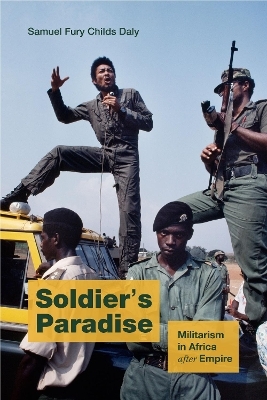
Soldier's Paradise
Militarism in Africa after Empire
Seiten
2024
Duke University Press (Verlag)
978-1-4780-3083-6 (ISBN)
Duke University Press (Verlag)
978-1-4780-3083-6 (ISBN)
Samuel Fury Childs Daly tell the history of how Africa’s postcolonial military regimes tried and ultimately failed to transform their societies into martial utopias.
In Soldier’s Paradise, Samuel Fury Childs Daly tells the story of how Africa’s military dictators tried and failed to transform their societies into martial utopias. Across the continent, independence was followed by a wave of military coups and revolutions. The soldiers who led them had a vision. In Nigeria and other former British colonies, officers governed like they fought battles—to them, politics was war by other means. Civilians were subjected to military-style discipline, which was indistinguishable from tyranny. Soldiers promised law and order, and they saw judges as allies in their mission to make society more like an army. But law was not the disciplinary tool soldiers thought it was. Using legal records, archival documents, and memoirs, Daly shows how law both enabled militarism and worked against it. For Daly, the law is a place to see decolonization’s tensions and ironies—independence did not always mean liberty, and freedom had a militaristic streak. In a moment when militarism is again on the rise in Africa, Daly describes not just where it came from but why it lasted so long.
In Soldier’s Paradise, Samuel Fury Childs Daly tells the story of how Africa’s military dictators tried and failed to transform their societies into martial utopias. Across the continent, independence was followed by a wave of military coups and revolutions. The soldiers who led them had a vision. In Nigeria and other former British colonies, officers governed like they fought battles—to them, politics was war by other means. Civilians were subjected to military-style discipline, which was indistinguishable from tyranny. Soldiers promised law and order, and they saw judges as allies in their mission to make society more like an army. But law was not the disciplinary tool soldiers thought it was. Using legal records, archival documents, and memoirs, Daly shows how law both enabled militarism and worked against it. For Daly, the law is a place to see decolonization’s tensions and ironies—independence did not always mean liberty, and freedom had a militaristic streak. In a moment when militarism is again on the rise in Africa, Daly describes not just where it came from but why it lasted so long.
Samuel Fury Childs Daly is Associate Professor of History at the University of Chicago and author of A History of the Republic of Biafra: Law, Crime, and the Nigerian Civil War.
Acknowledgments ix
Introduction 1
Part I. Militarism as a Civilization
1. The Master’s Tools: The Inheritance of Colonialism 37
2. The Soldier’s Creed: Discipline as an Ideology 65
3. The Portable Coup: The Jurisprudence of Military “Revolution” 101
Part II. Militarism’s Legal Forms
4. Oracles and Autocrats: The Uses of Customary Law 123
5. Fela Kuti Goes to Court: The Spectacle of Inquiry 143
6. The Gift of Martial Law: Military Tribunals for Civilians 167
Coda: Militarism’s Denouement 189
Notes 209
Bibliography 249
Index 275
| Erscheinungsdatum | 08.08.2024 |
|---|---|
| Zusatzinfo | 7 illustrations |
| Verlagsort | North Carolina |
| Sprache | englisch |
| Maße | 152 x 229 mm |
| Gewicht | 431 g |
| Themenwelt | Geschichte ► Teilgebiete der Geschichte ► Militärgeschichte |
| Geschichte ► Teilgebiete der Geschichte ► Wirtschaftsgeschichte | |
| Recht / Steuern ► Rechtsgeschichte | |
| Sozialwissenschaften ► Politik / Verwaltung | |
| ISBN-10 | 1-4780-3083-6 / 1478030836 |
| ISBN-13 | 978-1-4780-3083-6 / 9781478030836 |
| Zustand | Neuware |
| Haben Sie eine Frage zum Produkt? |
Mehr entdecken
aus dem Bereich
aus dem Bereich
neueste Manipulationstechniken als Waffengattung der NATO
Buch | Softcover (2023)
Westend (Verlag)
24,00 €
Deutschlands Schwäche in der Zeitenwende
Buch | Softcover (2023)
C.H.Beck (Verlag)
18,00 €


